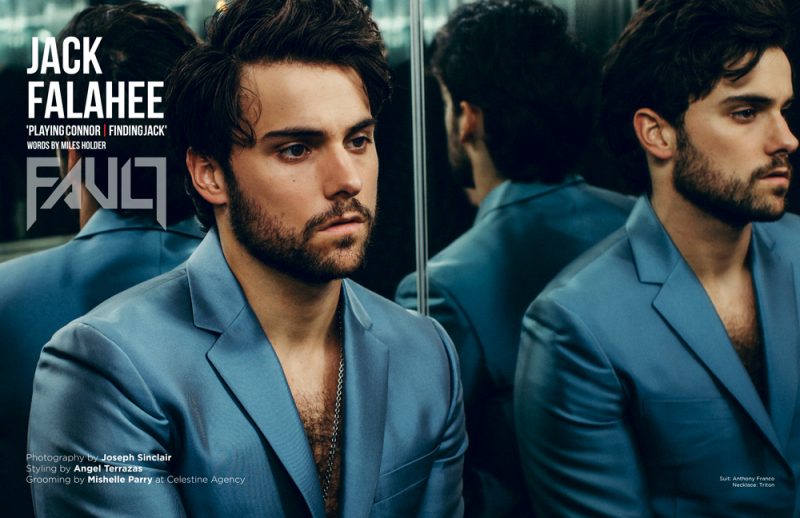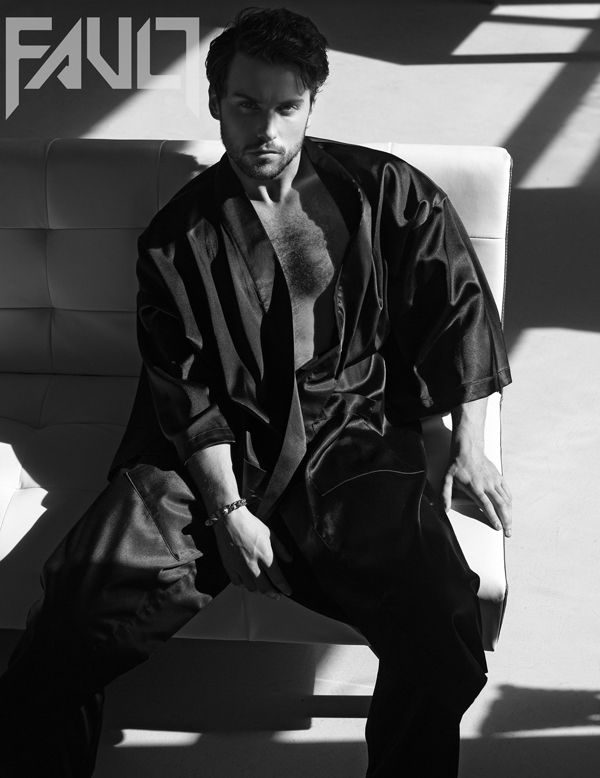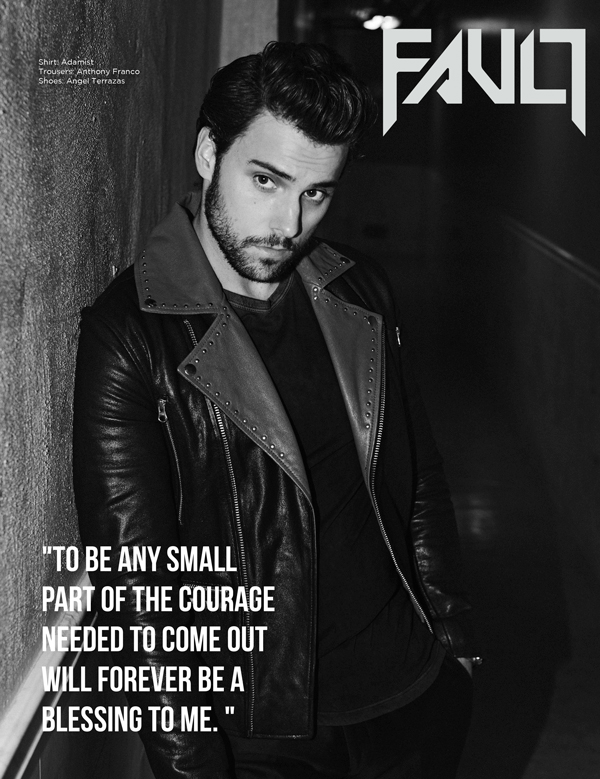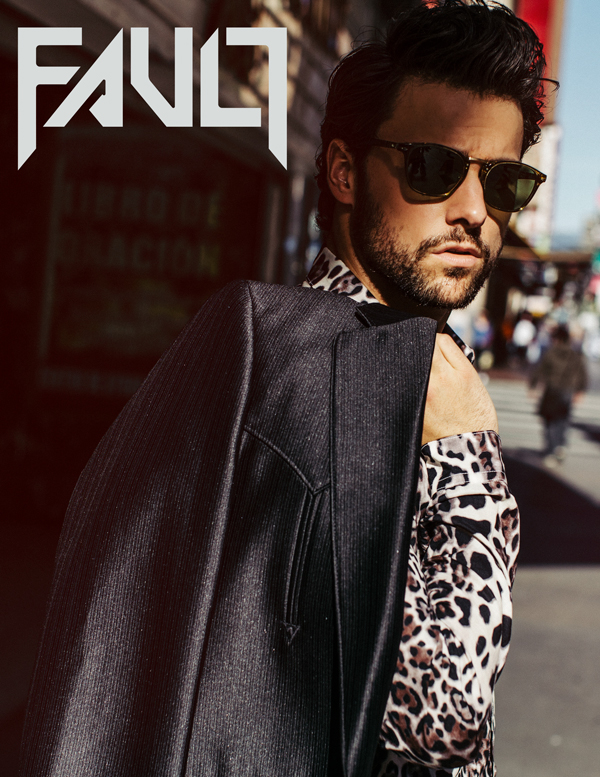HTGAWM’s Jack Falahee discusses lessons learnt from the LGBTQ community in FAULT Issue 25

Styling by Angel Terrazas
Grooming by Mishelle Parry at Celestine Agency
Jack Falahee ‘Playing Connor | Finding Jack’
Words: Miles Holder
How To Get Away With Murder first appeared on our screens in 2014 and is to this day one of America’s most progressive and expertly written television dramas. Oscar award winning actress, Viola Davis stars as the powerful, female, African-American lawyer without a defined sexuality nor reason to explain one. As an African American female actress, she will no-doubt have faced similar prejudices to that of the character she plays; however the same can not be said for the whole cast. Enter, Jack Falahee. Despite years of training at prestigious acting schools, it was the role of a homosexual college student, Connor Walsh that would provide Jack with a clear and untilfiltered glimpse into the LGBTQ community. It’s a credit to Jack’s skills as an actor, that Connor’s character and his sometimes turbulent relationship with his HIV-positive boyfriend have created strong discussions within and outside of the LGBTQ community. With that in mind, I sat down with Jack to find out what the character that means so much to so many different people – means to him.
You’ve got an impressive resume – you’ve studied so many different acting methods, what is it about television and the screen that mean you’ve gone down that route?
When I was at NYU I was originally admitted to study musical theatre but when I started hanging out with kids who had grown up with ballet classes and vocal coaches, I quickly realised I was a bit out of my depths. If I felt that way in a class of forty students, then going to an open audition for a broadway show was going to be a nightmare; and it was and I was cut very quickly.
I went to Amsterdam and studied the experimental theatre and then Shakespeare in the States but when I got into television acting, I was really inspired by the technical side of it. I grew up enjoying movies but when I started studying it I became aware of angles, what “the shot” was and just everything that is done to make a screenplay come to life. That really fascinated me and will likely lead to me producing and directing in my future.
What period of Connor’s character resonated with you the most?
Fundamentally he and I are very competitive and also very jealous people – it’s something which I’m personally working on but I don’t think Connor is! I grew up with 3 siblings and 2 brothers who are all wildly brilliant and whilst it was a house full of love, it was also incredibly competitive so I definitely relate to Connor in that way.
When you first got the role, did you think the show would have such an impact?
Frankly, you’re not thinking about that when you’re a struggling actor; you’re thinking about getting a job so you can pay rent and survive so I never really sat down and considered I’d be spending years of my life on the project.
I’m still not over how the much of an impact the show has made and a lot of that is Connor’s character and his importance to fans. It’s emblematic of my straight privilege, but I never thought his character would be so important to the LGBTQ community. When the finale came out and Oliver proposed to Connor, seeing the Twitter reaction was so overwhelming and I was just overjoyed at how meaningful the character is to people.
What are the best lessons you’ve learnt from your fans?
100% opening my eyes to the LGBTQ struggle and I can’t stress that enough. Going into this, it was never written on the page that “Connor Walsh is a homosexual”; so when it came to the first love scene I just thought, “wow this guy is willing to do whatever it takes to get ahead” and now I know that was the heteronormativity in my mind back then that was rationalising this whole aspect of his character. It wasn’t until Pete Nowalk was like “oh no, Connor is gay” that I’ve been really trying to become a student of the history of LGBTQ rights and learning more about the struggle of those in the past and in the present day. I asked Pete and my friends for a reading list on LGBTQ history because one of my favourite aspects about being an actor is that I’m continually having to learn about things I’ve been very uneducated on in the past. I’ve grown up with friends and family who aren’t straight white males so it was important for me to do Connor’s character justice. The outpouring of love from the fans was so gratifying and humbling for me. Receiving messages from fans saying “Connor & Oliver helped me come out to my parents” is deeply rewarding and to be any small part of the courage needed to come out will forever be a blessing to me.
Are you comfortable with your sex symbol status?
No! Well, it depends [laughs]. I go back and forth on this, on one hand, it’s a great boost to my confidence but on the other hand, it’s a very vulnerable thing to be. Women live their lives being objectified and reduced to just their bodies every day and it is awful so I’ve been discussing it with the women close to me. I obviously can never understand how women can go through life that way but I can see a glimpse of what that experience might feel like and it’s not a nice one.
Nine times out of ten, it’s all good fun and nice things are being said but that 10% of the time when people disregard my space or my wellbeing is not okay. People tell me “that’s what you signed up for” and I really don’t think it is! I was this chubby, awkward kid and now I’m a sex symbol with the help of great makeup and lighting experts making me look a certain way on tv and magazines.
What is FAULT?
I think that there is a part of me which is always seeking validation which is very informative of why I’ve become an actor; regardless of what might happen, I think I’ll always be seeking approval.
Read Jack’s full interview and see more exclusive photographs only in FAULT’s Special #25



